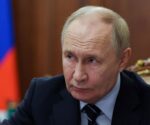Russia economy meltdown as small businesses face ‘shock’ tax raid – ‘we might not survive’ | World | News
Small businesses in Russia are set to be hammered by a punishing new tax as owners fear their shops will have to permanently close. The proposed tax hikes in 2026 would cut the annual revenue threshold for VAT tax breaks for small businesses from 60 million rubles (£553,000) to 10 million rubles (£92,000).
Businesses with annual revenues between 10 million and 250 million rubles (£2.3m) will have to pay VAT of up to 5% and hire accountants to handle their taxes. If the scheme is approved by parliament, one in 10 small business owners is expected to be impacted. Sergei Borisov is the head of the Opora small businesses lobby, which wrote a letter to speakers of both parliamentary chambers in an attempt to scrap it.
He called the new regime “a shock for all small businesses” as owners prepare to watch their shops go under.
Sergei Pakhomov, who manages a grocery shop in central Moscow, warned that the new, more complicated stax system will prove devastating for his business.
He said: “For years, we operated under the simplified tax system, which was clear and convenient. Now our costs will go up, and we don’t know how we will survive.”
Opora estimated that businesses could face a staggering 420 billion rubles (£3.8m) in additional costs and called for the VAT threshold to be set at 30 million.
The group said in its letter: “While not disputing the undeniable need to increase federal budget revenues to ensure national defence and security, it is important to note the extremely negative consequences for the microbusiness sector.”
A whopping 700,000 entrepreneurs could be impacted by the tax raid, with a third of the 11,000 business owners polled by Opora saying they will be ready to close down.
Roughly a third also said they may have to move into the informal economy and stop paying tax altogether.
Russia is also looking to hike the general VAT rate from 20% to 22% in an effort to raise one trillion rubles (£9.2bn) to fund its military spending and reduce the budget deficit.
Finance minister Anton Siluanov said in parliament this week that he was ready to adjust the proposal following fierce blacklash, but did not give any further details.









